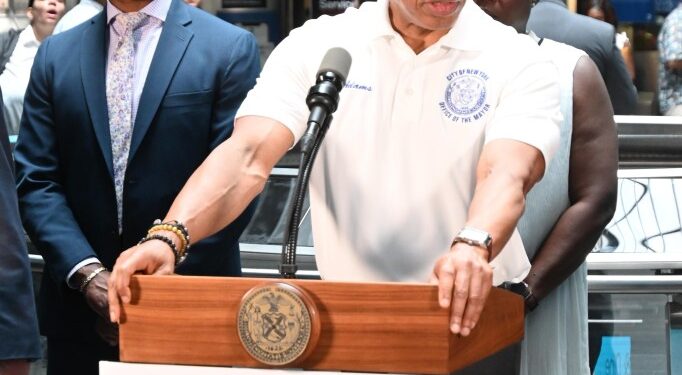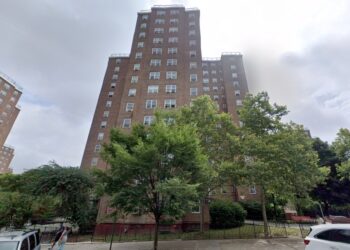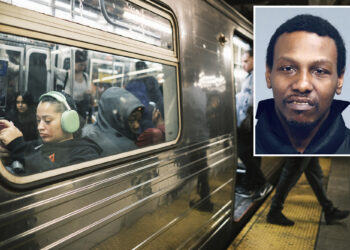Mayor Adams was rightly bragging last week that subway crime is down.
But New Yorkers, just as rightly, couldn’t get too excited: Above ground, core Manhattan below Central Park is having a bloody summer.
The juxtaposition illustrates how New York’s public-safety resources are stretched thin, something Adams has never addressed with a long-term plan.

Even for a Manhattan that has gotten used to a steady drip of post-2020 crime and disorder, the news of the last five weeks has been jarring.
On June 11, just after 10 p.m., a young woman, 22-year-old Jordin Walston, was stabbed to death on the sidewalk just outside the Port Authority Bus Terminal, near The New York Times’ headquarters.
Six days later, in the early afternoon, 53-year-old Efrain Patino Guerra, helping guests find cabs at the Times Square Riu Hotel, was sucker-punched by a driver. He died three weeks later.
On June 23, on 14th Street outside Stuyvesant Town, 38-year-old Clemson Coxfield was stabbed to death in an afternoon street fight.
Barely a week after that, passersby reported a trash bag that looked like it contained a body on a sidewalk in Kips Bay. It turned out to be 31-year-old Yazmeen Williams, killed in a nearby apartment July 1.
Two blocks away and little more than a week later, on July 9, a 55-year-old man was fatally stabbed inside Times Square “supportive housing.”

And two Fridays ago, 74-year-old Fermin Brito was killed in a mid-morning shooting in Tompkins Square Park that wounded another man.
In between came a July 4th evening mass-casualty drunk-driving murder, which killed four people celebrating the holiday in a Lower East Side park.
This is a lot of violence for once-safe Manhattan.
Through mid-July, Manhattan South — the southern half of the borough — has suffered 14 murders, 27% more than last year’s 11 over the same time frame.
This makes it hard to get too excited about Adams’s welcome news about reduced subway crime.
The surge of 1,000 police officers in the subway since February, who are making more arrests and issuing more summons, is (predictably) working: Subway crime is down 8% this year. (Although adjusted for ridership, violent felonies in May remained 54% higher than pre-pandemic levels.)
Problem is, with a police force hovering around 35,000 officers — close to 6,000 below the turn-of-the-millennium peak — more attention to subway disorder means less attention to above-ground disorder.
And several of these murders could have been prevented by more attention to above-ground order.
The 14th Street stabbing stemmed from a dispute over drugs and over open-air “flea market” sales of stolen goods — activities that nearby residents have complained about for years.
The Tompkins Square Park killing, same thing: The victim is thought to have been openly selling drugs, annoying rival dealers.
The alleged drunk driver who mowed down four people had a fake license plate — catchable via a traffic stop. But traffic stops today are less than two-thirds of 2019 levels.
And our social-services fixes, in lieu of policing, aren’t working: Both the alleged 14th Street killer and the 43rd Street killer lived in housing for the mentally ill.
Although Williams was killed indoors, the alleged suspect had open warrants for earlier, lower-level charges. (And maybe he could have served a longer sentence for one of his six previous felony convictions.)
Eventually, some crisis will force Adams to divert cops from the subways, too; a previous subway-cop surge in late 2022 dissipated with no public notice, and with a predictable reversal of early positive results.
Thin resources help explain why Adams can never claim a lasting victory.
As City Councilmember Keith Powers, who represents 14th Street, said recently, it feels like a game of whack-a-mole: fix one problem and another pops up.
Less than a year before his reelection bid, Adams wants to be the only modern mayor to preside over a reversal in crime without a larger police force — and his NYPD has a tougher job, in that suspects who are arrested are often immediately released.
Adams loves to race from crisis to crisis.
But New Yorkers remember when we used to prevent the crises from happening in the first place.
Nicole Gelinas is a contributing editor to the Manhattan Institute’s City Journal.



























